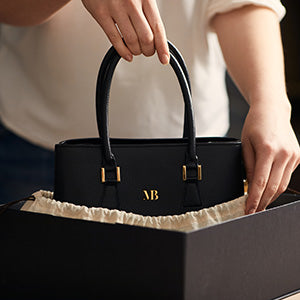Resolutions for a more sustainable 2021
In the first weeks of the new year, you have a lot of time to look back on the year. Did you achieve all of the goals you set yourself? Every new year offers us the chance to develop ourselves personally and put long-cherished plans into practice. The beginning of the new year is an ideal time to try out something new, as you are particularly motivated with the newly set goals. Do you already have resolutions for 2021?
In this article, we will provide you with some inspiration and implementation tips for everyone, who wants to make 2021 more sustainable. Of course, not every resolution has to be fully fulfilled - because every step, no matter how small, counts to make a positive change.
A first step towards more sustainability in everyday life is to reduce your own waste. In Germany alone, 44,428 thousand tons of waste are collected each year, of which 30.4% consists of household waste. The amount of waste in German households has even increased in recent years: paper, cardboard and packaging for single-use products and packaged food pollute the environment. Alternatively, to minimize this waste, food can be alternatively bought in reusable containers, like jars or glasses. Glass packaging can be refilled up to 50 times in the reusable system and can therefore be used for an average of six years. Food such as plant-based milk drinks, sauces and canned food can be bought in jars and last just as long as in plastic or coated paper packaging.
Other household waste can be saved by using your own packaging materials for store-bought food. Instead of packaged fruit and vegetables from the supermarket, you can also buy unpackaged fruit and vegetables. Many supermarkets now offer a selection of unpackaged varieties that can be packed in your own mesh bag. You can also bring your own tote bag for other purchases, instead of buying a new plastic bag or paper bag with every purchase. Tote bags are light and can be folded so small that they can fit in every handbag.
Did you know:
Each of our Melina Bucher bags comes in a dustbag to protect the bag. Dust bags tend to just lie around once you unwrapped your bag. Since we value sustainability, we want to give them a second life by upcycling them in an eco-friendly manner. Hence, our dust bags have handles and are designed as additional shopping bags you can use for grocery shopping
In Germany, 12 million groceries end up in the garbage every year: that is an average of 75 kilograms per person. In order to reduce your own food consumption, you could carefully shop in moderate amounts and use possible leftovers. These leftovers can be stored in the good old Tupperware container or in a jar with a silicone wrap.
In addition, the best-before date on the packaging does not mean that the product has expired and can no longer be used. The date is actually to be understood as a “minimum” date: it only indicates when the product could lose its taste and / or quality. Therefore, before throwing a product away, you can rely on your own senses: Does the product still look flawless? Does it still smell good? Then you can most likely continue to use it even after the expiry date!
In Germany, 16.4 billion plastic bottles are used every year, which is an average of 200 disposable plastic bottles per person. These can be returned to the deposit system after use. But what happens after that? After they are returned, disposable plastic bottles are being melted down and processed into so-called "PET recyclate". Around 34% of this material is actually used to manufacture new beverage bottles. The rest is downcycled for foils or fleece sweaters. Reusable bottles are a better choice: Reusable plastic bottles and glass bottles are being washed out to be refilled afterwards. The more circulations and the more regional the bottles are, the better the environmental balance. Compared to glass bottles, which can be refilled 50 times, reusable plastic bottles can only be used 15 times on average. However, tap water remains the most environmentally friendly alternative: tap water in Germany is of very good quality and is checked regularly so that it can be drunk without hesitation. In Germany, tap water is even more strictly controlled than mineral water from the supermarket. While mineral water is only tested for ten pollutants, tap water is tested for 33 pollutants. Other alternatives: a thermal mug can easily be used for drinks such as coffee and tea, and plastic straws can be replaced with glass straws or metal straws.

Glas oder metal straws are not only the more elegant but also more sustainable choice. (Sources: Gold metal straws: Pinterest / Chloé Dominik, Glas straws: Pinterest / PopSugar)
Instead of baking paper - which, by the way, can be used up to four times - reusable baking paper or silicone moulds are suitable for conscious baking. These are not only easy to clean, but also more environmentally friendly than traditional baking paper, which is not recyclable due to the non-stick coating.
Another sustainable resolution is to eat less meat. There are many reasons to minimize your own meat consumption: Alone in Germany, around 763 million animals are being killed annually for meat consumption (as of 2019). The majority of the animals are being kept, transported and slaughtered under conditions that are contrary to animal welfare. The animals' basic needs are being ignored and their freedom of movement is severely restricted. In addition, there is little space for the animals due to factory farming, so diseases can spread quickly. To avoid this, the animals are routinely given antibiotics, which is a threat to human health. A large number of studies link the consumption of meat to health problems. Meat consumption, for example, is associated with an increased risk of cardiovascular disease, type 2 diabetes and cancer. The German Society for Cardiology, Heart and Circulatory Research therefore recommends limiting the consumption of meat and animal fats. Replacing foods of animal origin with plant-based ones can minimize these risks. Studies have also found a positive correlation between breast cancer and dairy products: women who consume one cup of milk a day have a 50% increased risk of breast cancer. For women who consume two to three cups of milk a day, the risk of breast cancer increases by up to 80%. The meat industry also affects the environment. Around 77% of methane emissions are generated by factory farming, as well as raising animals for meat consumption uses 50% of the water in industrialized countries. That works out to be 15,500 litres for one kilogram of beef. In contrast, one kilogram of potatoes only needs 287 litres.
Did you know:
75% of all new infectious diseases are so-called zoonoses. These are diseases that are transmitted from non-human animals to humans. This also includes Covid-19. According to the UN and WHO, the increase in these diseases can be traced back to the intensification of agriculture and animal production, as well as the trade and consumption of wild animals.
Starting from January it is particularly easy to eat less meat or even to be completely vegan. Many programs and organizations support this under the motto "Veganuary" by publishing recipes or helpful tips on their website. On the Veganuary homepage, you can register to participate and receive advice on how to replace meat with plant-based products in small steps. Every year, over a million people take part in the program, including Joaquin Phoenix, Paul Mc Cartney and Evanna Lynch aka Luna Lovegood from Harry Potter. Therefore, Veganuary works together with companies to create a wider range of herbal products.

Veganuary offers a lot of vegan recipes, from beginners to advanced level (Source: Veganuary)
Another resolution to make 2021 more sustainable is to shop regionally and seasonally. Regional and seasonal foods are not only healthy, but they are also particularly environmentally friendly. This is due to the fact that the shorter domestic transport routes mean that less CO2 is emitted. In addition, regional and seasonal fruit and vegetables are harvested when they are actually ripe and therefore contain the maximum amount of vitamins. If you compare a German apple with an imported apple from New Zealand, the imported apple emits 5% more CO2, which is mainly due to the refrigeration and shipping.
Regional and seasonal foods are available in the supermarket or at the farmers' market. To help you find your way around regional or seasonal products, there is a seasonal calendar that shows when regional and seasonal fruit and vegetables can be found in the supermarket. In the supermarket you should pay attention to the origin of the food, as the word “regional” is not legally protected and can therefore also be used for imported goods. Here, farmers' markets have the advantage of transparency, because you know who grew the food and under what conditions it was grown. Regional food is not only cheaper than imported goods, but it is also fresher. This not only supports your health, but also the regional economy.
If you want to consume certain foods out of season, you should pay attention to fair trade seals. The Fair Trade seal stands for products that are grown in developing countries or by smallholder families under decent working conditions and are therefore more social and ecological than other imported goods.
Fast fashion brands produce clothing items that are designed to be worn only 30 times. Therefore, slow fashion is moving more and more to the fore. Slow Fashion means to produce fashion in a more environmentally friendly way: for example, by selecting natural and organic raw materials that are more sustainably produced and biodegradable. Particular emphasis is placed on durability in the design process and in production, so that the garment can be worn over a period of several years.
Many fashion brands opt for an environmentally friendly manufacturing process that includes organic cotton and recycled materials, which are produced under fair and ethical conditions. There are also second-hand platforms and platforms for fashion for rent on the Internet. This not only gives the item of clothing a second life, but also saves your wallet. You can read more tips for a more sustainable wardrobe in our magazine.
Vegan clothing is not only cruelty free but can also be more environmentally friendly. The HIGG Material Index, which is based on data from research institutes and industry to compare the environmental impact of various textile materials with regard to factors like climate influence, water use, energy use and eutrophication, animal materials such as wool, silk and leather are classifies as particularly harmful. Animal farming and the cultivation of animal foods are not even included in this calculation: The preservation of animal skins for leather, for example, requires around 30 production steps and around 150 chemicals. Vegan clothing is free of animal materials such as leather, wool, silk, down and fur, as well as free of animal glue, dyes or buttons and coatings.
Did you know:
Our Melina Bucher bags are 100% vegan and free from animal products. We are not only using vegan leather, but also adhesives, colour dyes, and accessories without animal ingredients – because we love our fur babies. For our engagement we received the PETA approved vegan and cruelty-free certification for all our handbags.
We hope that our resolutions for a sustainable 2021 have inspired you to change your routines a little bit. Of course, you don't have to achieve the resolutions immediately at the same time. Each person takes a different amount of time to establish a new habit. Therefore, be proud of every small step you take towards a positive change.
Melina Bucher wishes all Bucherbabes a healthy and successful new year 2021. We are thankful for the last eventful year and your trust in us. Thank you for all the support, your comments and all the exciting discussions with you. We have many exciting projects planned for next year. Have a look at our magazine for more tips on sustainability and fashion.


